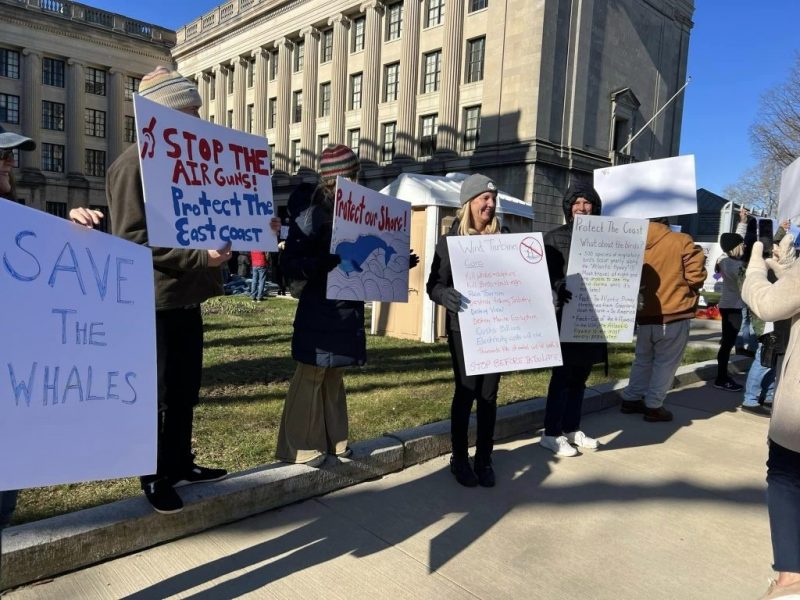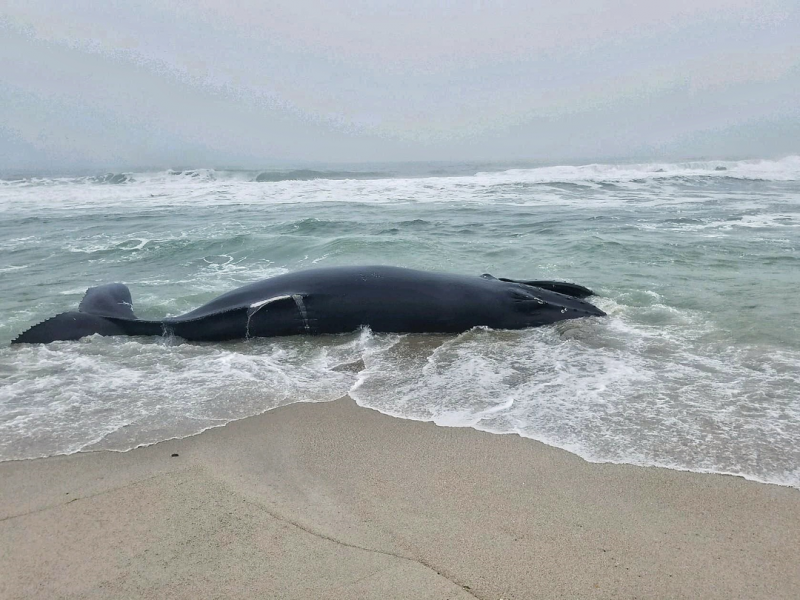Critics of offshore wind farms believe the projects are to blame for a series of whale deaths along the Atlantic coast. (Photo courtesy of Marine Mammal Stranding Center)
 By MADDY VITALE
In a potentially serious setback for offshore wind energy, the Pentagon is expressing concerns that wind farm projects along the East Coast could pose a threat to national security.
According to published reports, the Pentagon is troubled that the Biden administration has plans to expand offshore wind farm projects along the Atlantic coast, warning that nearly all of the new territory is in conflict with military operations. The areas of concern are off Delaware, Maryland, Virginia and North Carolina.
U.S. Rep. Jeff Van Drew, whose district includes the shore towns of Atlantic and Cape May counties, has been one of the most outspoken opponents of offshore wind energy.
Van Drew pointed to the Pentagon’s concerns as another reason why a moratorium should be placed on wind farm projects until there is further study of the impacts.
He said it is time for President Joe Biden and his administration to listen to the "valid" concerns."
"These warnings can no longer be ignored,” Van Drew said in a statement Monday. “This President and this administration continue to disregard these valid concerns, and now the Pentagon is reiterating the potential impacts the industrialization of our coast will have on our national security. We need to put America first and we need a moratorium on these projects until it is far too late."
By MADDY VITALE
In a potentially serious setback for offshore wind energy, the Pentagon is expressing concerns that wind farm projects along the East Coast could pose a threat to national security.
According to published reports, the Pentagon is troubled that the Biden administration has plans to expand offshore wind farm projects along the Atlantic coast, warning that nearly all of the new territory is in conflict with military operations. The areas of concern are off Delaware, Maryland, Virginia and North Carolina.
U.S. Rep. Jeff Van Drew, whose district includes the shore towns of Atlantic and Cape May counties, has been one of the most outspoken opponents of offshore wind energy.
Van Drew pointed to the Pentagon’s concerns as another reason why a moratorium should be placed on wind farm projects until there is further study of the impacts.
He said it is time for President Joe Biden and his administration to listen to the "valid" concerns."
"These warnings can no longer be ignored,” Van Drew said in a statement Monday. “This President and this administration continue to disregard these valid concerns, and now the Pentagon is reiterating the potential impacts the industrialization of our coast will have on our national security. We need to put America first and we need a moratorium on these projects until it is far too late."

 Congressman Jeff Van Drew waves to the audience during a March 16 congressional hearing on the possible negative impacts of wind farms.
He further stated that "when the Bureau of Ocean Energy Management's (BOEM) own environmental impact statement admitted that offshore wind will have no impact on climate change, there was no response from the (Biden) administration."
And when the “National Oceanic and Atmospheric Administration's (NOAA) own scientist raised concerns with how these projects could affect the endangered right whale, he was ignored,” Van Drew continued.
Van Drew pointed to his congressional hearing at the Wildwoods Convention Center in March.
“When my hearing revealed that these massive turbines could interfere with radar systems and highlighted the warnings from our own military, this administration continued full steam ahead,” he said.
Opposition to offshore wind farms has been particularly intense as residents and elected officials continue to strongly denounce them at rallies and other public forums.
Protect Our Coast NJ, an independent grassroots organization opposed to offshore wind energy farms, held a rally in March in Trenton urging the governor to hear their concerns. Several South Jersey elected officials, including Council members, mayors and state assemblymen, were also in attendance and voiced opposition and concern about the projects.
Gov. Phil Murphy, a strong supporter of offshore wind technology, wants New Jersey to become a leader in green energy. So far, New Jersey has approved three offshore wind farms and is looking to add more. Murphy’s goal is to have offshore wind farms producing 11,000 megawatts of power in New Jersey by 2040.
Congressman Jeff Van Drew waves to the audience during a March 16 congressional hearing on the possible negative impacts of wind farms.
He further stated that "when the Bureau of Ocean Energy Management's (BOEM) own environmental impact statement admitted that offshore wind will have no impact on climate change, there was no response from the (Biden) administration."
And when the “National Oceanic and Atmospheric Administration's (NOAA) own scientist raised concerns with how these projects could affect the endangered right whale, he was ignored,” Van Drew continued.
Van Drew pointed to his congressional hearing at the Wildwoods Convention Center in March.
“When my hearing revealed that these massive turbines could interfere with radar systems and highlighted the warnings from our own military, this administration continued full steam ahead,” he said.
Opposition to offshore wind farms has been particularly intense as residents and elected officials continue to strongly denounce them at rallies and other public forums.
Protect Our Coast NJ, an independent grassroots organization opposed to offshore wind energy farms, held a rally in March in Trenton urging the governor to hear their concerns. Several South Jersey elected officials, including Council members, mayors and state assemblymen, were also in attendance and voiced opposition and concern about the projects.
Gov. Phil Murphy, a strong supporter of offshore wind technology, wants New Jersey to become a leader in green energy. So far, New Jersey has approved three offshore wind farms and is looking to add more. Murphy’s goal is to have offshore wind farms producing 11,000 megawatts of power in New Jersey by 2040.
 Orsted proposes to build a wind farm 15 miles off the South Jersey coast between Atlantic City and Stone Harbor. This photo shows the turbines for an Orsted project overseas. They are smaller than the turbines planned for the project off the South Jersey coast. (Photo credit Orsted)
Orsted proposes to build a wind farm 15 miles off the South Jersey coast between Atlantic City and Stone Harbor. This photo shows the turbines for an Orsted project overseas. They are smaller than the turbines planned for the project off the South Jersey coast. (Photo credit Orsted)